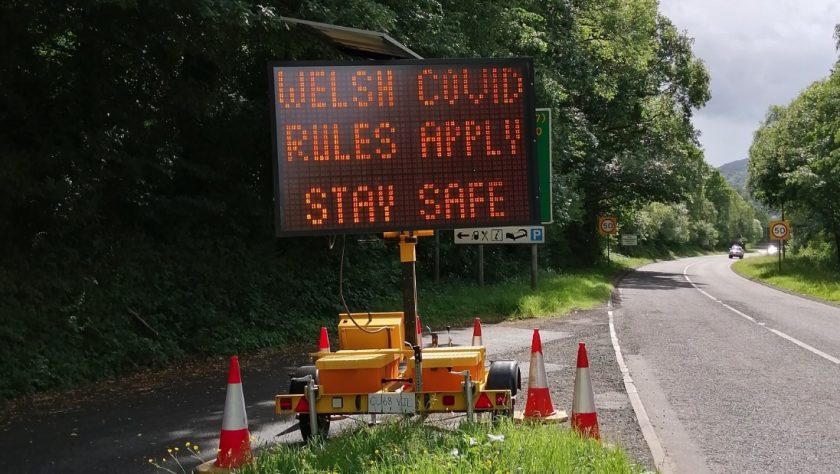“There must be radical reform” in Wales to build resilience to whole-system civil emergencies

“Never again can a disease be allowed to lead to so many deaths and so much suffering”.
That was a key finding from today’s initial report from the UK Covid-19 Inquiry, which is critical of the response in Wales to the pandemic finding “reality did not match the rhetoric” around resilience systems and process.
The UK Covid-19 Inquiry’s investigations are organised into Modules. The Inquiry has published its first report and recommendations today following its investigation into the UK’s ‘Resilience and preparedness (Module 1)’
It examines the state of the UK’s central structures and procedures for pandemic emergency preparedness, resilience and response.
There are elements of a Wales focus within that work, with an examination of the systems and structures in place from Welsh Government through to local resilience activities including volunteer work.

The report states, “Notwithstanding the range of entities in Wales ostensibly charged with preparedness, Sir Frank Atherton, Chief Medical Officer for Wales from August 2016, established the Health Protection Advisory Committee in May 2018. This was to bring together a range of organisations involved in health protection issues. Its purpose was to help understand the broad sweep of threats from infectious diseases – no other committee had previously been convened to address such threats or to look at health protection issues.”
However notes, “For an administration that prided itself on its efficiency of movement because of its relative lack of scale, and which had described itself as operating, effectively, ‘under one roof’, the reality did not match the rhetoric.
“The system was labyrinthine. The Inquiry was not persuaded by the mitigation offered by Dr Goodall that it made more sense to those within the system than those outside of it.
“An opportunity to create a coherent and, therefore, dynamic system in Wales had been hampered by undue complexity.”
It also references a December 2012 report by the Wales Audit Office on civil contingencies in Wales which concluded: “Too many emergency planning groups and unclear accountabilities add inefficiency to the already complex resilience framework … the current structure is leading to inefficiencies at a local level, unnecessary complexity and unclear accountabilities …. and is an ineffective framework for resilience in Wales”
“The complexity of the system risks ‘fragmentation of resilience activity with potential overlaps or gaps in the arrangements for resilience’ “.
The findings in today’s report on that state, “These observations were as true in 2020, as the Covid-19 pandemic struck Wales, as they were when the report was written in 2012. Not much had been done in the meantime by the Welsh Government to simplify, streamline and rationalise the entities charged with leading and administering emergency preparedness in Wales.”
The report also contains some first hand accounts, for example from Anna-Louise Marsh-Rees, co-leader of Covid-19 Bereaved Families for Justice Cymru:
“Something that was not communicated to us was that once somebody with Covid dies, they are almost treated like toxic waste. They are zipped away and you – nobody told us that you can’t wash them, you can’t dress them, you can’t do any of those things, the funerals, the ceremonies, you just can’t do any of those. You couldn’t sing at a funeral. You know, we’re Welsh, that’s something you have to do … my dad did not have a good death. Most of our members’ loved ones did not have a good death … when we left the hospital, my dad – we were given my dad’s stuff in a Tesco carrier bag. Some people were given somebody else’s clothes that were in a pretty awful state. It’s those things like that that don’t often get considered … there is such a thing as a good death, and I think that was very overlooked during the pandemic … there is a whole generation, my mum’s generation, who haven’t got the mechanisms like maybe I have to complain and question, and they are heartbroken and really in shock. You know, my mum cries daily and – even though it’s nearly three years … it’s just – they’re just left with that feeling of nobody cared.”³
The Rt Hon the Baroness Hallett DBE writes, “Ultimately, the UK was spared worse by the individual efforts and dedication of health and social care workers and the civil and public servants who battled the pandemic; by the scientists, medics and commercial companies who researched valiantly to produce life-saving treatments and ultimately vaccines; by the local authority workers and volunteers who looked after and delivered food and medicine to elderly and vulnerable people, and who vaccinated the population; and by the emergency services, transport workers, teachers, food and medicinal industry workers and other key workers who kept the country going.
“Unfortunately, the expert evidence suggests that they will be called upon again. It is not a question of ‘if’ another pandemic will strike but ‘when’. The evidence is overwhelmingly to the effect that another pandemic – potentially one that is even more transmissible and lethal – is likely to occur in the near to medium future.
“Unless the lessons are learned, and fundamental change is implemented, that effort and cost will have been in vain when it comes to the next pandemic.”
There are wider recommendations from the first module, however some are specific to Wales as well, which should see some urgent action taken:
Recommendation 1: A simplified structure for whole-system civil emergency preparedness and resilience
The governments of the UK, Scotland, Wales and Northern Ireland should each simplify and reduce the number of structures with responsibility for preparing for and building resilience to whole-system civil emergencies.The core structures should be:
a single Cabinet-level or equivalent ministerial committee (including the senior minister responsible for health and social care) responsible for whole-system civil emergency preparedness and resilience for each government, which meets regularly and is chaired by the leader or deputy leader of the relevant government; and
a single cross-departmental group of senior officials in each government (which reports regularly to the Cabinet-level or equivalent ministerial committee) to oversee and implement policy on civil emergency preparedness and resilience.
This should be put in place within 12 months of the publication of this Report.Within 6 months of the creation of the group of senior officials, it should complete a review to simplify and reduce the number of structures responsible for whole- system civil emergency preparedness and resilience.
Subsequently, within 24 months of the publication of this Report, the ministerial committee should rationalise and streamline subordinate or supporting groups and committees responsible for whole-system civil emergency preparedness and resilience. Any groups and committees retained or created to support this core structure should have a clear purpose and should report regularly about progress with, and completion of, tasks assigned to them.
Recommendation 7: Publication of findings and lessons from civil emergency exercises
For all civil emergency exercises, the governments of the UK, Scotland, Wales and Northern Ireland should each (unless there are reasons of national security for not doing so):publish an exercise report summarising the findings, lessons and recommendations, within three months of the conclusion of the exercise;
publish an action plan setting out the specific steps that will be taken in response to the report’s findings, and by which entity, within six months of the conclusion of the exercise; and
keep exercise reports, action plans, and emergency plans and guidance from across the UK in a single, UK-wide online archive, accessible to all involved in emergency preparedness, resilience and response.
Recommendation 8: Published reports on whole-system civil emergency preparedness and resilience
The governments of the UK, Scotland, Wales and Northern Ireland should each produce and publish reports to their respective legislatures at least every three years on whole-system civil emergency preparedness and resilience.The reports should include as a minimum:
the risks that each government has identified are likely to result in whole-system civil emergencies;
the recommendations that have been made to each government to mitigate those risks, and whether these recommendations have been accepted or rejected;
a cost–benefit analysis setting out the economic and social costs of accepting the risks as against taking action to mitigate the risks;
who may be vulnerable to the risks and what steps are being taken to mitigate those risks;
a plan setting out the timescales for implementing the recommendations that have been accepted; and
an update on the progress that has been made on implementing previously accepted recommendations.
< blockquote>
Recommendation 9: Regular use of red teams
The governments of the UK, Scotland, Wales and Northern Ireland should each introduce the use of red teams in the Civil Service to scrutinise and challenge the principles, evidence, policies and advice relating to preparedness for and resilience to whole-system civil emergencies. The red teams should be brought in from outside of government and the Civil Service.
Spotted something? Got a story? Email [email protected]











